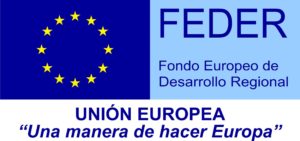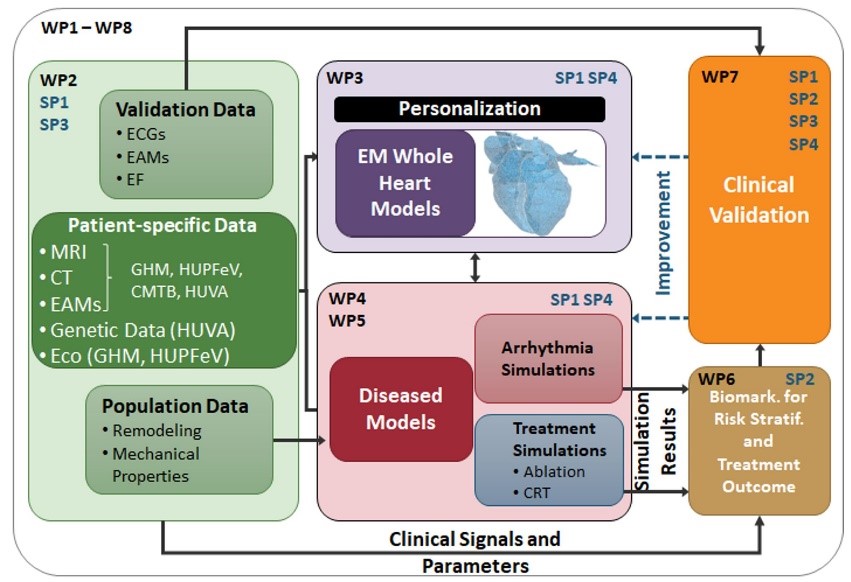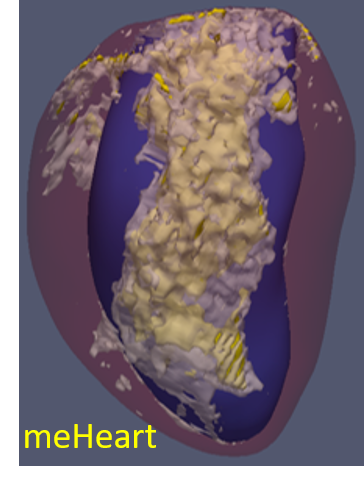Coord. Project: Computational mechano-electric model of the human heart to design personalized therapies
Project. CI2B-UPV: MMulti-scale modeling of cardiac pathologies and optimization of personalized therapies
Cardiac arrhythmias and contractile dysfunction are strongly connected and represent a major worldwide public health problem, being one of the main causes of morbidity and mortality in industrialized countries and having a significant economic impact on Spanish public health
system. Ventricular arrhythmias are potentially life-threatening arrhythmias that may lead to ventricular fibrillation, and cause sudden cardiac death, which is responsible for 20% of all deaths. Sudden cardiac death is associated to myocardial infarction survivors, genetic diseases, and other factors of risk. On the other hand, atrial fibrillation is the most common arrhythmia and increases markedly with age. It is thus crucial to use advanced techniques of risk assessment to help identify future cardiac events and the development of personalized therapies becomes a national health priority. In the last decades, computational electrophysiological and mechanical cardiac models have been realistically formulated and used to understand pathological mechanisms and assess the efficiency of drug and device therapies. The combination of multiphysics models remains challenging and is a priority in computational health research. The main objectives of this project are (i) to develop and clinically validate a family of personalized multi-scale electro-mechanical models of the whole human heart, including specific characteristics for each patient, such as gender, anatomy and electrophysiology, and specific disease conditions, and (ii) to develop new biomarkers and stratification risk indices, using signal processing, machine learning and artificial intelligence techniques, to guide clinical diagnosis and to predict and optimize cardiac arrhythmia treatments by selecting the right treatment for the right patient. Personalized models will be constructed based on imaging, noninvasive electrical and mechanical measurements provided by the clinician partners. The semi-automatic methodologies implemented by the consortium will be improved. Patient-specific disease conditions related to atrial fibrillation, myocardial infarction, heart failure and inherited pathologies will be included to the whole heart model. The expertise of the partners in optimizing computational tools will enable efficient simulations Mechano-electric simulations will shed light into the mechanisms leading to cardiac arrhythmias and contractile dysfunction in conditions of atrial fibrillation, heart failure, myocardial infarction and inherited diseases. Cardiac imaging data, as well electrical and mechanical data obtained from diseased patients will help to the model construction, but will also be used to define new biomarkers for risk stratification. Virtual biomarkers obtained from simulations will also be taken into consideration. The efficacy and safety of electric therapies will also be assessed based on simulation results and on specific biomarkers with the aid of artificial intelligence techniques. The consortium gathers scientific leaders in in silico heart modeling, high performance computing, artificial intelligence and Clinical management of cardiac arrhythmias and treatments ensuring the execution of the project. The results of using computational personalized medicine will help clinical guidance and will suppose an important progress in the diagnosis, prevention and treatment of cardiac diseases significantly reducing costs in the design of electrical devices for cardiac treatment.
Under execution.




